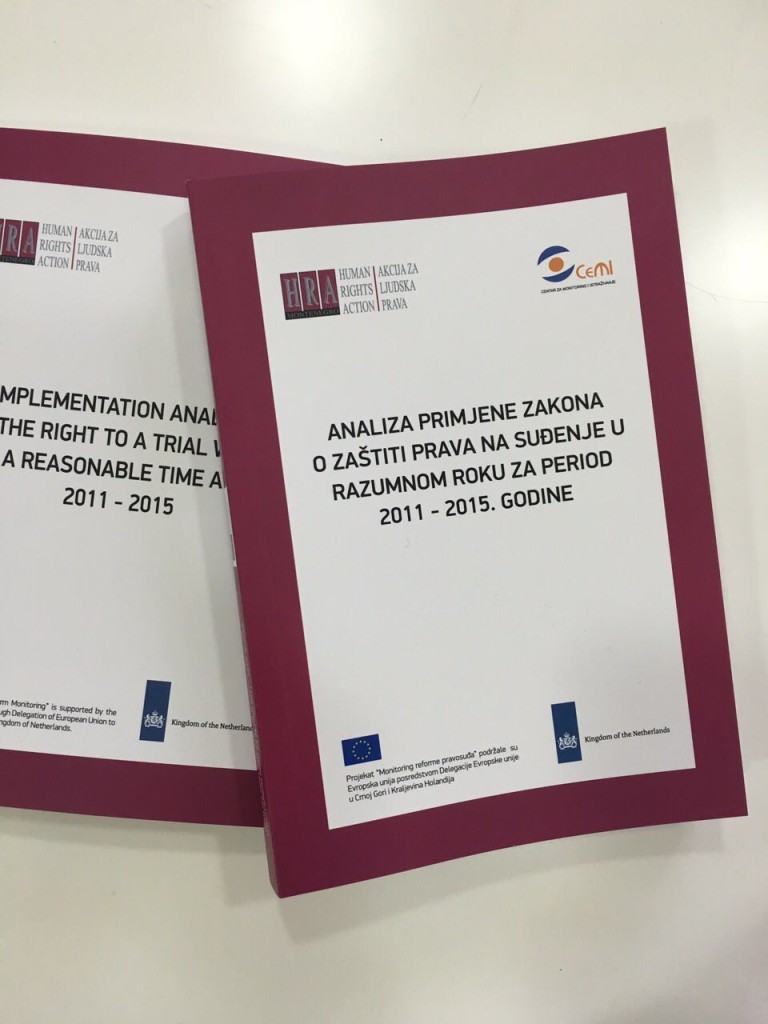25/2/2017 CSOs PROJECTS IN SPECIAL PSYCHIATRIC CLINIC – SECOND PART
25/02/20175/3/2017 DRAFT CRIMINAL CODE AS A MISSED OPPORTUNITY FOR REFORM
05/03/201726/2/2017 PUBLICATION “IMPLEMENTATION ANALYSIS OF THE RIGHT TO A TRIAL WITHIN A REASONABLE TIME ACT 2011-2015”
 The remedies for the protection of the right to a trial within a reasonable time, the request to expedite the proceedings and claim for just satisfaction are in minor use, compared with the size of backlog before the courts in Montenegro. Both remedies in practice are still not sufficiently effective for speeding up the trials and protection of the right to trial within a reasonable time.
The remedies for the protection of the right to a trial within a reasonable time, the request to expedite the proceedings and claim for just satisfaction are in minor use, compared with the size of backlog before the courts in Montenegro. Both remedies in practice are still not sufficiently effective for speeding up the trials and protection of the right to trial within a reasonable time.
In the period 2011-2015 the presidents of courts granted only every fourth request to expedite the proceedings, while the Supreme Court upheld every other claim. In more than a quarter of cases, in which the Supreme Court found a violation of the right to a trial within a reasonable time, requests to accelerate the proceedings had previously been rejected by final decision. The research conducted on representative samples shows that in, 2/3 of the cases, granting of a request for review did not lead to acceleration of the procedure within the statutory deadline of 4 months.
The presidents of courts should review their decision-making upon request for review and ensure that in any case in which they accept the request for review it leads to acceleration of the procedure within the statutory deadline.
In the practice of the Supreme Court there is no clear criterion for determining the amount of just satisfaction (non-pecuniary damages), as applied by the European Court of Human Rights. It has not been ensured that a judgment adopting the claim and establishing a violation of the right leads to an urgent conclusion of the proceedings.
Below are more detailed conclusions and recommendations of the research conducted by the lawyer Darka Kisjelica within the project “Judicial Reform Monitoring”, conducted by the NGO Human Rights Action (HRA) and the Center for Monitoring and Research (CeMI) with the support of the European Union and the Kingdom of the Netherlands. The publication is available in Montenegrin and English language.
DELAY IN PUBLICATION: The study was meant to be published in April 2016, but was delayed first by refusing of the Basic Court in Podgorica and Higher Court in Podgorica to provide access to information and then by eight months delay of the Agency for Protection of Personal Data and Free Access to Information to decide on appeals against the courts’ decisions. The Agency violated the statutory deadline for deciding on appeals thirteen times and than the administrative inspection failed to sanction such behavior. This illegal conduct of state authorities is an illustrative example of a systemic obstruction of reforms in Montenegro.
CONCLUSIONS AND RECOMMENDATIONS
- Two remedies provided under the Right to a Trial within a Reasonable Time Act – request to expedite the proceedings, i.e. request for review and claim for just satisfaction for breach of the right to a trial within a reasonable time – were used on average three or four times more in the period 2011-2015 as compared to the first three years of implementation of the Act (2008-2010), but remain underused in relation to the existing backlog of cases in the courts. Even though there is a noticeable trend of reducing the backlog of cases before the courts in Montenegro, at the end of 2015 a quarter of cases from 2011 and previous years remained unresolved (2,437), while a request for review was lodged in only 7% of those cases, and a claim for just satisfaction in 1.5% of cases (Chapters II.1 and II.2).
- Only a quarter of requests to expedite the proceedings were adopted either by granting the request or notifying the party that the proceedings would be accelerated, while 3/4 were rejected or dismissed (half were rejected and 1/5 dismissed on procedural grounds). In more than 1/4 of cases in which the Supreme Court found a violation of the right to a trial within a reasonable time, a request for review had previously been rejected in a final decision (Chapters III, IV and V.4).
- In 10% of cases (50) in relation to the overall number of rejected requests, the presidents of courts clearly unjustifiably rejected requests for review and appeals lodged in very lengthy proceedings, some even over thirty years long, acting thus contrary to the criteria set out in Art. 4 of the Act and the practice of the European Court of Human Rights. Only a fifth of those decisions were overturned. It is advisable to introduce the presidents of courts to the European Court of Human Rights practice vis-à-vis protection of the right to a trial within a reasonable time (Chapter III.2.2).
- Completion of the proceedings upon a request for review by notifying the party that within four months a decision would be made or procedural steps taken was much rarer than in the past. During 2008-2010 period, as much as 42% of cases were completed in such a manner, and from 2011 to 2015 only 15.7% of cases. We believe that notification to the party, in cooperation with the judge, should be used much more frequently (Chapter IV.1).
- In 2/3 of the sample analysed[1] notification to the party did not lead to acceleration of the procedure within the statutory deadline (Chapter IV.1).
- In the reporting period only 11% of the requests for review were granted. In 2/3 of the sample[2] a decision to grant a request for review did not result in acceleration of the proceedings within the prescribed deadline (Chapter IV.2).
- Only in one in five decisions granting the request, the presidents of courts ordered a judge to take action within a specific timeframe and provide feedback thereafter. Presidents of courts should regularly make use of this very important authority for effective acceleration of the proceedings (Chapter IV.2). When the procedure as a whole is unduly delayed, presidents of courts should strive to ensure that it be quickly completed by granting a request for review or notifying the party in cooperation with a judge that the case would be completed within four months, or that during that period actions would be taken that lead to its completion (Chapter III.2.2). If a new judge holds no responsibility for granting of a request for review in the case due to previous unjustified delay, it should be ensured that granting of such request does not reflect negatively on his/her evaluation (Chapter IV.3).
- Statistical reporting in annual reports of the Judicial Council on the work of some courts with regard to requests for review and appeals for individual courts differs from the actual situation in the cases submitted by those courts (Chapter VI).
- Claims for just satisfaction for violations of the right to a trial within a reasonable time were lodged and also adopted more frequently than before. In the observed period (2011-2015) the number of claims has increased four times compared to the first few years of application of the Act, while the Supreme Court granted every other claim (Chapter V.1).
- The maximum amount of just satisfaction awarded was € 4,000 in two civil cases, and in criminal cases € 3,500, while the maximum amount of € 5,000 has not been awarded since the beginning of implementation of the Act. The criterion used by the Supreme Court to establish the amount of just satisfaction is unclear. Following the example of the European Court of Human Rights, the Supreme Court should adopt a formula for determining the amount of fair compensation. We believe that the limit pertaining to the amount of just satisfaction should be deleted from the Act (Chapters V.2 and IX).
- A claim for just satisfaction is not an effective remedy for the purpose of accelerating the proceedings, however, it should be ensured that it is, particularly because in 1/3 of the cases the Supreme Court found a violation of the right to a trial within a reasonable time in legal cases in which a request to accelerate the procedure had previously been rejected, and in some cases claims were filed two times in the same case. We propose that the Act provide for the compulsory delivery of the Supreme Court’s ruling upholding the claim to a judge handling the case in respect of which the claim was adopted, as well as to a president of the court before which the case is pending, together with an order to immediately finalize the procedure, i.e. to take necessary action within three months, so that the claim, i.e. the ruling upholding the claim could lead to acceleration of the procedure (Chapters V.4 and IX).
- Reports of the Ministry of Justice of the Government of Montenegro have not yet been drafted in a manner so as to weigh the achievement of the purpose of the Right to a Trial within a Reasonable Time Act in relation to the effective acceleration of judicial proceedings. We suggest that the reports also include statistical indicators about the timeframe of handling by the courts following the granting of a request for review and delivery of the notification, particularly with regard to observing legal deadlines, which would be a reliable basis for assessing the effectiveness of these remedies (Chapter VII).
- We support recommendations provided by the Ministry of Justice and the Ombudsman to organize training for lawyers on the application of remedies for the protection of the right to a trial within a reasonable time (Chapter VII).
- The European Court of Human Rights has held that the means to protect the right to a trial within a reasonable time in Montenegro are generally effective, i.e. that the citizens must use them before lodging an application with the ECtHR. Although we have come to an alarming discovery that the ECtHR has taken such a stance on the basis of incomplete information received from Montenegro, we believe that it is not disputable that a request for review and claim for just satisfaction should be used prior to addressing the Constitutional Court of Montenegro and the ECtHR. However, in the opinion of the ECtHR as well, the effectiveness of each of these remedies is assessed in each individual case, and the report indicates – based on representative sample – that granting of a request for review in as many as 2/3 of the cases failed to lead to the expected acceleration of the procedure within the legal deadline of 4 months (Chapter X).
We hope that the adoption of these recommendations will lead to effective protection of the right to a trial within a reasonable time in each individual case in Montenegro.
[1] The sample consisted of 42% of cases completed in this manner. The sample would be twice the size if the President of the Basic Court in Podgorica to access information.
[2] The sample consisted of 28% of cases completed in this manner. The sample would be three times higher that the President of the Basic Court in Podgorica to access information.







 English
English